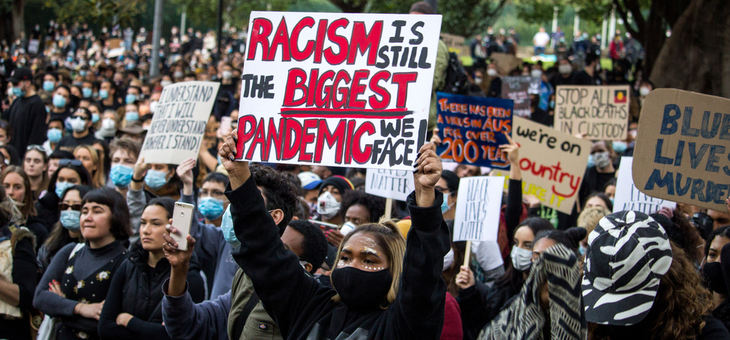Prime Minister Scott Morrison has come out breathing fire after a protester at a Black Lives Matter rally in Melbourne tested positive for COVID-19.
The PM said yesterday that protesters who attended rallies in breach of public health orders should face charges.
He was speaking hours after authorities in Victoria announced that a man who attended a rally in Melbourne on Saturday had tested positive for COVID-19. The man may have been infectious at the protest, but was unlikely to have contracted the virus there, medical authorities said.
It could be another week before it is known if other protesters had caught the virus, they said, with contact tracing still in process.
“Obviously seeing tens of thousands of people on the streets concerns us greatly about the potential for spread of infection, particularly because those are people who are coming together from different places, meeting together and then returning back to their usual homes and workplaces. So clearly there’s a risk of transmission and gatherings of this kind. We were pleased to see people taking individual risk mitigations and trying to keep distancing, but in a crowd of that size, that’s very challenging,” said the director of Epidemiology at the Doherty Institute, Professor Jodie McVernon.
Victorian Chief Health Officer Brett Sutton said he did not know whether the man had been using the COVIDSafe app.
The announcement brought into sharp focus a warning from the Organisation for Economic Co-operation and Development (OECD) that predicts Australia’s economic output could contract by 6.3 per cent this year if there is a second wave of COVID-19.
Mr Morrison claims that would equate to a $25 billion hit to the economy.
“People wanting to take (protests) further this weekend are showing a great disrespect to their fellow Australians,” he said.
The OECD also warns that any early withdrawal of economic support heightens the risks to the economy, adding that the government must consider investing in social housing and strengthening the social safety net rather than weakening it.
The JobKeeper and expanded JobSeeker schemes are due to end in September at the same time as loan payment holidays introduced by the major banks are set to cease.
The Royal Australian College of General Practitioners (RACGP) also says we are far from out of the woods even though we have fared better then many other countries around the world.
“I think we’ve really not had a major crisis yet. So those who think COVID’s done and dusted, we really have had very little of it. And that’s put us in an enviable position globally, but we are still a highly susceptible population. There are still cases in our community. There are still people coming into our country with COVID and, we must remain vigilant, remain cautious and stamp out any cases and small outbreaks that are observed as soon as they occur, to not get into that situation of having widespread community transmission,” said Prof. McVernon.
GPs say they must be given more government support to protect patients while the virus continues to circulate in the community.
The RACGP says the government is not doing enough to support GPs protecting COVID-positive patients during the crisis, lashing the shortage of personal protective equipment such as gloves and masks and conflicting messaging. It also wants a continuation of subsided teleheath consultations.
RACGP president Dr Harry Nespolon said the country’s response to the pandemic had been well-coordinated but much more could have been done in the early stages.
“Because state and territory governments manage the health crisis response and the federal government has primary responsibility for general practice, GPs have not been properly embedded into the wider pandemic response,” he said.
“This is not new. We have been drawing attention to this problem for years.”
The pandemic exposed those shortcomings, said Dr Nespolon, and inconsistent and confusing messaging and advice from governments – and celebrities – had added to the problem.
He added that governments needed to be more proactive in encouraging patients to take care of their own wellbeing.
“One problem we are facing is that patients are delaying or avoiding GP consultations due to fears concerning COVID-19. People with serious existing health conditions are not having their conditions reviewed and patients are not seeing their GP when new symptoms emerge,” he said.
“Governments need to play a more active role in communicating to the public the importance of not delaying a consultation with their GP, whether for existing health conditions or new health concerns. It is safe to attend general practice because we have safety processes in place and patients need to realise that.”
Overdue improvements to primary care must be made quickly, he said, pointing to the temporary Medicare Benefits Schedule items introduced to support telephone and video consultations in general practice.
More than 99 per cent of GP clinics had taken up these options and they must be continued beyond 30 September this year for all Australians, Dr Nespolin said.
Are you still being mindful of social distancing and hygiene? Have you noticed that some in community are not?
If you enjoy our content, don’t keep it to yourself. Share our free eNews with your friends and encourage them to sign up.
Related articles:
https://www.yourlifechoices.com.au/health/covid19/is-complacency-costing-you-thousands
https://www.yourlifechoices.com.au/retirement/retirement-income/money-going-to-the-wrong-people
https://www.yourlifechoices.com.au/health/your-health/finding-joy-in-the-simple-things

